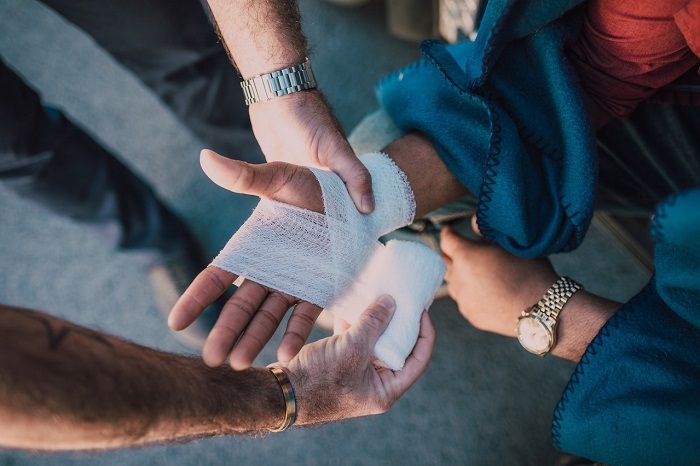Property viewing is exciting and fun, especially for those starting a new life chapter. But accidents can occur anywhere, anytime, and to anyone, even during real estate showings. Some of these incidents may even end up in lawsuits or out-of-court settlements.
The following are some common accidents that may occur in a property showing:

- A couple is thrilled to visit an open house, hoping to find their first home together. Everything seems perfect as they walk around, checking different rooms and parts of the house. But on their way down the stairs, it begins to creak, and one ends up falling and getting injured.
- A family of four attends a showing of a cozy cottage by the lake. The home is welcoming, and a fireplace is set up to warm the guests. While the agent tours the family, one of the children goes astray. He wanders off near the fireplace and sustains a burn injury.
- A woman was invited to an estate showing to view a new apartment on the market. From the ceiling to the flooring, everything in the home looked great. While checking out the place, she trips on a loose tile, causing an ankle sprain.
- A young man eager to live on his own visits an open house. Although there was an “Off Limits” sign in the backyard, he decided to check out the area to get a better perspective. He talked to the real estate agent and was given the signal to walk around while others were also exploring. As he’s sightseeing, a dog suddenly appears and attacks him.
Determining Liability
The accidents that occur in an open house aren’t always the fault of a single person. It can be the real estate agent, homeowner, or guests looking to buy the place. Establishing who’s liable for the damages or injuries depends entirely on what happened in the accident, who was involved, and how it transpired. It’s crucial to clarify this to be a step closer to resolutions or out-of-court settlements.
- Real estate agent
A real estate agent or broker may be held liable under the following circumstances:
- Caused a hazard in preparation for a viewing
- Failed to remove dangers before the open house
- Neglected to warn guests about known or suspected risks before the showing
Arranging an estate viewing can involve tidying and cleaning up the property. But if the real estate agent sets off a dangerous condition, they’ll be accountable for injuries or damages. Some examples are putting up candles or fixing the fireplace that might lead to a burn injury, adding fixtures that may be risky for children to break, and mopping the floors that may cause a guest to slip.
- Homeowner
A home or property owner is charged for damages or injuries correspondingly:
- An existing hazard was left on the property
- Neglected to eliminate the danger before the open house
- Failure to inform the real estate agent or guests about the problem
One of the common examples of homeowner liability is leaving an animal on the loose during a viewing. Another instance can be when the owner neglects to have repairs or maintenance done to preserve the house. Knowing about defective parts but not disclosing them to the real estate agent and guests is also a situation illustrating that the homeowner is at fault.
- Guest
The law states that any person invited to a showing is recognized as an “invitee.” With that consideration, the real estate agent and homeowner are often responsible for safe proofing the area. It’s also referred to as a duty of care. However, in cases where a child gets injured, the parents may be held partly liable for not keeping a close eye.
Premises Liability
An individual injured in a real estate showing can file for a premises liability claim. It’s applicable when a person sustains injuries brought about by an unsafe property. Based on the examples, the premise’s liability is incurred from the dangerous stairs and a dog on the loose.
Depending on the laws existing per state, there may be differences in handling such cases. But generally, a victim would be required to show evidence of the property owner, their negligence with the property’s upkeep, and the injuries suffered. These can help build up the proof for the injured to receive claims and out-of-court settlements if they wish to press charges.
Factors Affecting Liability
Before claims and out-of-court settlements are pursued, assessing some factors that impact liability is important. Anyone can get injured in an open house; it can be the real estate agent or broker, the potential buyers, or even a trespasser.
Liability sometimes falls often and heaviest on the homeowner since it’s their property, but an injured individual’s status can also affect it. They’re categorized into invitee (potential buyers or clients), licensee (real estate agent or broker), and trespasser.
- Status of the injured
Invitee – The homeowner is obliged by the duty of care to make the property safe for invitees. It makes sense mainly because they’re possibly buying the house, which benefits the homeowner.
Licensee – Although the homeowner should still clear up the property for the safety of licensees or real estate agents, the least they can do is inform them of any existing hazards. This way, they can minimize the chances of injuries or damage and warn potential buyers about any danger.
Trespasser – An individual who enters or remains unauthorized on someone’s property is considered a trespasser. If they get injured, the homeowner isn’t responsible for them. The only duty of the homeowner is not intended to hurt them.
- Ordinary negligence
An individual suffers an injury or loss in an open house, usually due to negligence. Real estate agents, especially homeowners, are responsible for freeing the space from hazards. If not possible, they must post warning signs or inform people about them.
It’s almost impossible for homeowners to escape liability because the duty of care requires them to have their property thoroughly examined and observe maintenance. It should expose and prevent any hazards. At the same time, it would have a domino effect, preventing future issues and charges and having to make out-of-court settlements.
- Settlements
Once liability has been established, you can pursue settlements. The injured person may sue whoever is at fault. Different types of insurance can step in to prevent the case from reaching the court and instead resolve to out-of-court settlements, minimizing greater charges.
The person who incurred injury or damage has health insurance usually to pay medical bills. This compensation for damages is an example of an out-of-court settlement. You may demand any other losses and expenses from liable persons. A liability insurance policy can help as this would equally distribute responsibility between all parties involved. It can also offer some legal assistance.
Here’s an example of an out-of-court settlement: a liable individual offers financial aid to a person injured in a real estate showing to compensate for lost wages and other expenses during the recovery period.
Another illustration of an out-of-court settlement is when a guest appeals for insurance payment for damage recovery. It usually happens when the homeowner is proven to have breached the duty of care in the real estate showing.
You can also apply an out-of-court settlement for non-injury situations. For example, a potential buyer breaks a vase displayed in a showing, despite being told by the real estate agent not to touch it. The warning was ignored, putting the liability on the potential buyer. If they propose to pay for the damaged vase, it makes it an out-of-court settlement.
There are varying insurance policies that have different coverages, and these are helpful in the event of pursuing out-of-court settlements. But it’s still advised for individuals who are at fault to consult or hire a lawyer to assess the situation thoroughly. It may reduce the severity of the charges.
Resolving the Conflict
Any accident is an occurrence anyone would want to avoid. Suffering injury and losses can be just as heavy as facing charges and providing compensation. If such incidents happen, determining liability and moving toward an out-of-court settlement may be the fairest way of managing the situation.
Other legal considerations for property viewings include preparation, prevention, and protection. There’s much planning and working before an open house, including inspection, repairs, and cleaning. Although these can be costly, they’ll help prevent accidents and save money in the long run, especially having out-of-court settlements. Before a real estate showing, the best action is to have protection through general liability insurance and other plans that provide excellent coverage. These offer financial security and would benefit out-of-court settlements, legal fees, and possible additional charges.
Content help by
Samantha is a content marketing consultant who is currently with RMD Law, LLP – an Orange County, California-based personal injury law firm that specializes in helping victims who have been injured in accidents.





